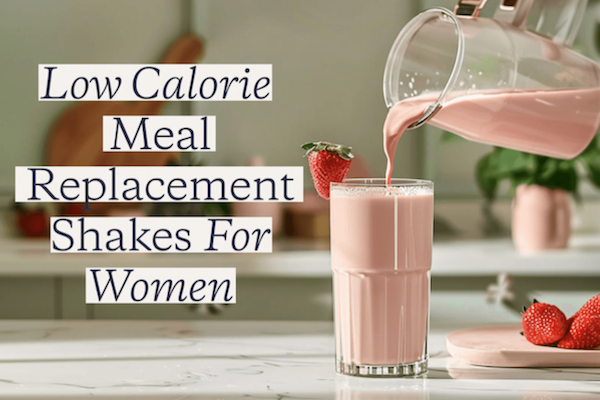If you’re struggling with weight gain during perimenopause or menopause, you’re not alone. Many women find that despite eating well and exercising, the pounds creep on. That’s why we created the menopause diet 5 day plan to lose weight — a simple, structured approach that supports healthy weight management, balances hormones, and provides the nutrition your body needs at this stage of life.
In Eve Biology's consumer trials, menopausal and perimenopausal women lost an average of 5.3lbs using meal replacement shakes 5 days a week.
Article Overview
- Menopause Diet: 5 Day Plan To Lose Weight Basics
- 5 Day Menopause Diet Meal Plan
- Why Meal Replacements Work In The Menopause Diet
- High Protein, Low Carb Dinner Recipes
- Why 50% Of Women Gain Weight During Menopause
- Exercise & Lifestyle Tips For The Menopause Diet
- Key Takeaways From The Menopause 5 Day Plan
- FAQ On The Menopause Diet & Weight Loss
Menopause Diet 5 Day Plan To Lose Weight Basics
The menopause diet 5 day plan to lose weight is based on replacing breakfast and lunch with nutritionist-approved meal replacement shakes for 5 weekdays, and enjoying high-protein, low-carb dinners that the whole family can eat.
On weekends, you take a break from shakes and eat three balanced meals a day. This flexibility makes the menopause diet 5 day plan sustainable, enjoyable, and effective.
5 Day Menopause Diet Meal Plan
Day 1 - Monday

Caffeine free espresso won’t make hot flashes or anxiety symptoms worse. Healthy Cottage Pie is the ultimate comfort food and a crowd-pleaser. This version is nutrient-rich, can be made in advance, and is freezer friendly.
- Breakfast - Vanilla shake with caffeine free espresso shot
- Lunch - Chocolate and Vanilla shake
- Snack - Protein flapjack
- Dinner - Healthy Cottage Pie
Day 2 - Tuesday

Salmon is rich in protein and omega-3s to support heart and brain health. Pair with seasonal greens or salad. Mixing up shake flavours helps keep the plan interesting.
- Breakfast - Strawberry Shake
- Lunch - Chocolate & Strawberry shake
- Snack - Oat cake with peanut butter
- Dinner - Pistachio and Herb Crusted Salmon
Day 3 - Wednesday

This creamy chicken dish is rich in protein and flavour. Flaxseeds add heart-healthy fibre and a nutty taste.
- Breakfast - Chocolate shake with half banana
- Lunch - Vanilla shake with flaxseeds and raspberries
- Snack - Protein flapjack
- Dinner - Creamy Garlic & Spinach Chicken Breast
Day 4 - Thursday

Swapping spaghetti for spiralised courgette cuts carbs and calories. Lower carbs help stabilise blood sugar and energy levels.
- Breakfast - Vanilla Shake with caffeine free espresso
- Lunch - Strawberry shake
- Snack - 2 x Nut clusters
- Dinner - Courgetti Bolognaise
Day 5 - Friday

A fragrant, slow-cooked lamb tagine served with cauliflower rice keeps carbs low and flavour high.
- Breakfast - Vanilla shake with oat milk
- Lunch - Chocolate & Strawberry shake
- Snack - 2 x Protein balls
- Dinner - Lamb Tagine
Discover Eve Biology's Meal Replacement Shakes
Why Meal Replacements Work In The Menopause Diet
- Packed with vitamins and minerals including Vitamin D, C, Calcium, Iron, Zinc, and B vitamins
- Plant proteins (pea & faba bean) to support metabolism and maintain muscle
- Formulated to European Food Safety Standards for weight control
- Prebiotic fibre to support gut and hormone health
- Structured 5 day plan with shakes for breakfast & lunch, and protein-rich dinners
High Protein, Low Carb Dinner Recipes
You’ll get 10 recipes written by functional medicine nutritionist Sarah Flower, designed to support weight loss, gut health, and hormone balance. These family-friendly recipes are flexible and protein-rich to boost metabolism and reduce menopausal symptoms.
Why 50% of Women Gain Weight During Menopause
Hormonal changes, reduced muscle mass, higher stress, poor sleep, and changes in eating habits all contribute to midlife weight gain. Understanding these factors makes the menopause diet 5 day plan to lose weight more effective.
Exercise & Lifestyle Tips For The Menopause Diet
Regular aerobic exercise (walking, cycling, swimming) and strength training are key for maintaining muscle, boosting metabolism, and supporting bone health. Even 20–30 minutes daily can improve weight management, sleep, and mood.
Key Takeaways From The Menopause 5 Day Plan
- Replace breakfast & lunch with shakes, enjoy high-protein dinners
- Weekends allow flexibility and balanced meals
- Focus on protein, fibre, and healthy fats
- Regular exercise is essential for sustainable weight loss
Frequently Asked Questions
What is the menopause diet 5 day plan to lose weight?
It’s a structured eating plan that combines meal replacement shakes with high-protein, low-carb dinners to create a calorie deficit and support hormone balance during menopause.
Do meal replacement diets work?
Yes, provided they meet strict calorie and nutrient guidelines. Eve Biology shakes meet European standards for weight control and are clinically proven to support weight management.
Why am I gaining weight on meal replacement shakes?
Not all shakes are created equal. Some are too high in calories or lack essential nutrients. Eve Biology’s shakes are designed specifically to support healthy weight loss in midlife women.






